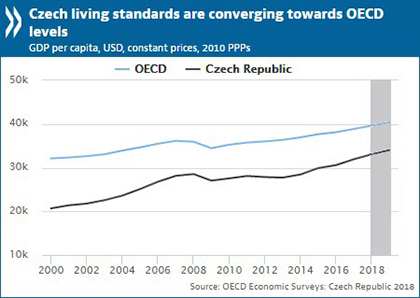The Czech economy is thriving but boosting skills and productivity and transitioning to a low-carbon productive model is vital to sustainable and inclusive growth
The Czech economy is thriving, with robust employment, expanding exports and falling government debt. Efforts should now focus on boosting workforce skills and innovation to improve labour supply and productivity, further reduce poverty and inequality, and green the economy, according to two new OECD reports.

The OECD Economic Survey of the Czech Republic says average living standards are gradually improving, with per capita GDP at 82% of the OECD average in 2017.
Growth is projected at 3.8% in 2018 and 3.2% in 2019, with labour shortages contributing to a deceleration from the high 2017 growth rate of 4.6%.
Other challenges include rising house prices, a rapidly ageing population and low wages, which are picking up but will need to increase faster for living standards to fully converge with OECD levels.
“The Czech economy is booming, but labour and skills shortages could create a bottleneck that would cramp future growth,” said OECD Secretary-General Angel Gurría, presenting the survey in Prague alongside Prime Minister Andrej Babiš. “Upgrading and updating professional skills would be a win-win for inclusive growth as it would help improve job quality, raise wages and advance wellbeing, ensuring that all Czech citizens benefit from economic progress.”
Greater flexibility in work hours and more affordable childcare could help ease the labour squeeze by increasing the share of women in work, particularly those with young children.. The pressures of an ageing society could be reduced by linking the retirement age to life expectancy and broadening the financing of health and old-age care. The Czech Republic is among the fastest ageing countries in Europe with the ratio of retirees to workers set to rise from 28% in 2016 to a peak of 56% in 2058. Ageing-related spending makes up 43% of the government budget and could rise to 75% without action. The Survey recommends better hospital management, primary care coordination and pay incentives to improve the financial sustainability of the health system.
A new Environmental Performance Review of the Czech Republic, also presented by Secretary-General Gurría during his visit to Prague, shows the country’s progress in reducing greenhouse gas emissions and replacing some of the coal that dominates the electricity mix with nuclear and renewables. It says, however, that a greater political commitment to a low-carbon economy will be needed to meet long-term climate goals, including the Paris Agreement objectives.
The Czech economy is one of the most carbon intensive in the OECD due to its large heavy industry sector and its reliance on coal. The share of renewables used for electricity is the fourth lowest in the OECD. Air quality is another challenge, with premature deaths from ambient air pollution around twice the OECD average at 633 per million inhabitants.
The Review recommends the Czech Republic align its energy policy with its climate policy and the Paris Agreement on climate change. The level and application of energy taxes should also be adjusted to impose a meaningful price on carbon. Action should also be taken to divert waste from landfills and increase urban density for sustainable development.
Source: Organization for Economic Co-operation and Development
- 226 reads
Human Rights
Ringing FOWPAL’s Peace Bell for the World:Nobel Peace Prize Laureates’ Visions and Actions

Protecting the World’s Cultural Diversity for a Sustainable Future

The Peace Bell Resonates at the 27th Eurasian Economic Summit

Declaration of World Day of the Power of Hope Endorsed by People in 158 Nations

Puppet Show I International Friendship Day 2020

